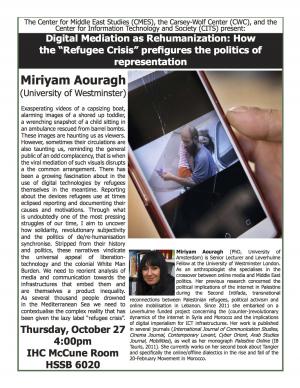Event Date:
Event Location:
- McCune Room IHC
- HSSB 6020
In this talk, Dr. Miriyam Auoragh reports about the devices that refugees use to report and document their causes and motivations. Through what is undoubtedly one of the most pressing struggles of our time, she aims to uncover how solidarity, revolutionary subjectivity and the politics of de/re-humanization synchronize. Stripped from their history and politics, these narratives vindicate the universal appeal of liberation- technology and the colonial White Man Burden. She believes that we need to reorient analysis of media and communication towards the infrastructures that embed them and are themselves a product inequality. As several thousand people drowned in the Mediterranean Sea, she thinks that we need to contextualize the complex reality that has been given the lazy label “refugee crisis”.
Miriyam Aouragh is Senior Lecturer and Leverhulme Fellow at the University of Westminster London. As an anthropologist she specializes in the crossover between online media and Middle East politics. Her previous research concerned the political implications of the internet in Palestine during the Second Intifada, transnational reconnections between Palestinian refugees, political activism and online mobilization in Lebanon. Since 2011 she embarked on a Leverhulme funded project concerning the (counter-)revolutionary dynamics of the internet in Syria and Morocco and the implications of digital imperialism for ICT infrastructures. Her work is published in several journals (International Journal of Communication Studies, Cinema Journal, Contemporary Levant, Cyber Orient, Arab Studies Journal, Mobilities), as well as her monograph Palestine Online (IB Tauris, 2011). She currently works on her second book about Tangier and specifically the online/offline dialectics in the rise and fall of the 20-February Movement in Morocco.
This talk is co-sponsored with the Center for Middle East Studies (CMES) and The Carsey-Wolf Center

